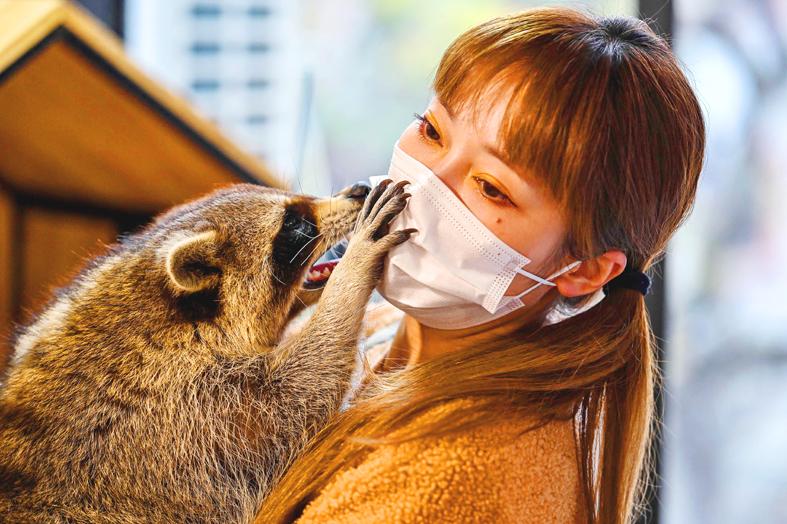A baby raccoon to stroke while you sip your skinny latte? Or a snake to coil around you after your cappuccino?
Forget dog or cat cafes, Shanghai’s animal cafe scene has expanded to include a wider — and more exotic — kingdom.
The fad in dining alongside all manner of species — from raccoons to pigs and reptiles — comes despite concerns fueled by the COVID-19 pandemic about the dangers of deadly viruses jumping from wild animals to humans.

Photo: AFP
There are dozens of animal cafes in China’s biggest city, with visitors helping to drive the craze by posing for photographs with the creatures and sharing them on social media.
Tucked away in central Shanghai, Raccoon Cafe is home to eight of the mammals. The biggest of them, weighing about 10kg, jumps up and down by a window, seemingly agitated by customers.
“I think it’s really cute,” said Qin Siyu, a 27-year-old professional volleyball player who found out about the cafe from a friend’s photographs.
Customers pay from 98 yuan (US$15) for entry, but it is debatable how much of the venue actually functions as a cafe. The raccoons’ behavior is too unpredictable for people to have hot drinks around them and the menu is limited.
The cafe’s owner, Cheng Chen, said that she had no first-hand experience of raccoons before taking over the establishment at the end of last year.
They can be aggressive, Cheng said, and she has the scars on her wrists to prove it.
The 36-year-old understands why some people might question whether it is fair for the raccoons to be kept in a cafe, eating dog food.
Cheng, who seems to have a genuine affection for the raccoons, is an animal lover, and has several dogs and cats at home.
She hopes the government would make it more difficult to own and breed such animals, to prevent them from falling into the hands of people who are less concerned about their welfare.
“Generally, there’s no special regulation. In fact, especially in China, the regulation for pets may be relatively weak,” Cheng said.
In another Shanghai animal cafe, snakes, iguanas and geckos delight the customers.
Owner Wang Liqun has 30 snakes, among them corn snakes and kingsnakes — neither species is venomous, but they can bite.
Wang is yet to have such an incident with a customer.
A visitor who gave only her surname, Tang, said that the cafe helps people to get over their fears.
“After coming here they will feel that it’s not what they thought and may find reptiles actually quite lovely,” the 27-year-old said.
However, Evan Sun (孫全輝), a scientist with World Animal Protection, said that he was “deeply concerned” about such cafes.
“Wild animals are having a miserable life in these cafes, enduring huge suffering and pressure,” said Sun, the charity’s wildlife campaign manager for China.
“The close interactions with wild animals not only fuel suffering and cruelty, but also creates a hotbed of diseases that could exacerbate the likelihood of zoonotic diseases’ emergence and spread,” he said. “Most customers [who] visit animal cafes are animal lovers, but they do not know that their consumption choices have such a negative impact to both wild animals and humans.”

A fire caused by a burst gas pipe yesterday spread to several homes and sent a fireball soaring into the sky outside Malaysia’s largest city, injuring more than 100 people. The towering inferno near a gas station in Putra Heights outside Kuala Lumpur was visible for kilometers and lasted for several hours. It happened during a public holiday as Muslims, who are the majority in Malaysia, celebrate the second day of Eid al-Fitr. National oil company Petronas said the fire started at one of its gas pipelines at 8:10am and the affected pipeline was later isolated. Disaster management officials said shutting the

US Vice President J.D. Vance on Friday accused Denmark of not having done enough to protect Greenland, when he visited the strategically placed and resource-rich Danish territory coveted by US President Donald Trump. Vance made his comment during a trip to the Pituffik Space Base in northwestern Greenland, a visit viewed by Copenhagen and Nuuk as a provocation. “Our message to Denmark is very simple: You have not done a good job by the people of Greenland,” Vance told a news conference. “You have under-invested in the people of Greenland, and you have under-invested in the security architecture of this

Japan unveiled a plan on Thursday to evacuate around 120,000 residents and tourists from its southern islets near Taiwan within six days in the event of an “emergency”. The plan was put together as “the security situation surrounding our nation grows severe” and with an “emergency” in mind, the government’s crisis management office said. Exactly what that emergency might be was left unspecified in the plan but it envisages the evacuation of around 120,000 people in five Japanese islets close to Taiwan. China claims Taiwan as part of its territory and has stepped up military pressure in recent years, including

UNREST: The authorities in Turkey arrested 13 Turkish journalists in five days, deported a BBC correspondent and on Thursday arrested a reporter from Sweden Waving flags and chanting slogans, many hundreds of thousands of anti-government demonstrators on Saturday rallied in Istanbul, Turkey, in defence of democracy after the arrest of Istanbul Mayor Ekrem Imamoglu which sparked Turkey’s worst street unrest in more than a decade. Under a cloudless blue sky, vast crowds gathered in Maltepe on the Asian side of Turkey’s biggest city on the eve of the Eid al-Fitr celebration which started yesterday, marking the end of Ramadan. Ozgur Ozel, chairman of the main opposition Republican People’s Party (CHP), which organized the rally, said there were 2.2 million people in the crowd, but